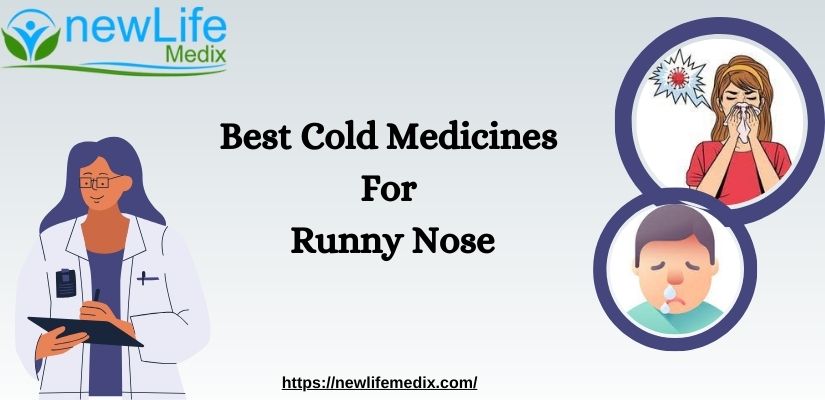Having a runny nose is quite common, especially in the ‘Winter’ season. A mild running nose will generally get better on its own with enough rest and plenty of water intake. However, chronic runny noses caused due to allergies are required to be treated with medicine. So it is very important to take the best cold medicines for runny nose
To stop a runny nose, you must know what is causing it. This article will cover all the medications, causes as well as complications that can come from leaving a runny nose untreated.
Causes of Runny Nose:
There could be many causes of runny nose (rhinorrhea) which include:
Temporary causes
- Viruses (Flu, colds, COVID-19)
- Sinusitis
- Cold weather
- Certain medications
- Certain foods and drinks
Long-lasting causes:
- Hormones
- Allergies
- Nasal polyps
The mucus drainage varies depending on the cause of the runny nose. If it is caused by a virus, the mucus would be yellow and thick. However, if allergies are the cause of your rhinorrhea, the mucus might be clear accompanied by other allergic symptoms like sneezing and itching.
Best Cold Medicines For Runny Nose:
Prescription and over-the-counter (OTC) medications may help you with a runny nose. However, you must know its cause before choosing the right medication. For instance, medicines used to treat viral infections would not help, if you have an allergic infection.
Nasal Sprays:
The type of nasal spray one chooses depends on the causes of rhinorrhea. A few nasal sprays recommended are:
- Topical nasal steroids, such as Nasonex nasal (mometasone) and Flonase (fluticasone propionate)
- Saline nasal spray (the saltwater solution used to rinse nasal passages)
- Topical nasal antihistamines, which include Astelin and Astepro (azelastine), and Patanase (olopatadine)
- Topical nasal mast cell stabilizers, like NasalCrom (cromolyn)
- Topical nasal anticholinergics, such as Atrovent Nasal (nasal ipratropium)
OTC Medications:
These include:
- Decongestants like Sudafed (pseudoephedrine) to relieve congestion.
- Pain relievers, like Tylenol (acetaminophen), and nonsteroidal anti-inflammatory drugs (NSAIDs), like aspirin, will not help a runny nose treatment if you also have other symptoms like headache or fever.
- Antihistamines, such as Benadryl (diphenhydramine), Claritin (loratadine), and Zyrtec (cetirizine), block histamine production of allergy relief.
Coping With Rhinorrhea:
There are a few things you can do to cope with a runny nose, which would help you recover a little faster and avoid spreading your illness to others.
- Blow your nose
- Stay hydrated and well-nourished
- Keep your nose and skin around it moisturized
- Throw away dirty tissues and keep your hands clean
- Get plenty of rest
Cold Medication Interaction:
Below-mentioned sections will show you how certain cold medicines could interact with drugs for other health conditions.
Diabetes
People taking medications to regulate their blood sugar levels in the body must consult a doctor before taking any cold medication.
Sugar is often found in cough syrups. Before taking cough syrup, people suffering from diabetes must ensure that the tonic is sugar-free.
High Blood Pressure
Oral decongestants can raise blood pressure and are harmful for patients suffering from hypertension.
Individuals having high blood pressure must talk to a doctor before taking any cold or runny nose medicine with a decongestant.
Pregnancy:
The most popular fever or runny nose medicines are acetaminophen, aspirin, and ibuprofen. Aspirin and ibuprofen are NSAIDs.
The FDA (Food and Drug Administration) does not recommend to use of NSAIDs from the 20th week onwards because they lead to low amniotic fluid. During pregnancy, one must speak to their doctor before taking oral decongestants. Inhaled decongestants might be a better alternative.
Depression
Decongestants might interact with antidepressants such as MAOIs (Monoamine oxidase inhibitors). Patients taking antidepressants must consult a doctor about the use of any cold medications.
When to See a Doctor?
Rhinorrhea is generally cured within a week to 10 days. However, leaving a runny nose untreated might lead to a sinus infection as the fluid builds up to the sinus. The risk of ear infections could rise if sinus infections, colds, and allergies are left ignored.
Take medical care if you see the following symptoms with a runny nose:
- Facial swelling
- Throat pain that gets worse
- Blurred vision
- Nasal discharge that smells bad or is dark in color
- Spots on the throat
- If nasal discharge occurs after a head injury
- Symptoms that last more than 12 days
Conclusion:
In conclusion, Various things could cause a runny nose, including viruses, allergies, and cold weather. Often, treatment is not required for a runny nose. However, you might find relief from some home remedies like steam, warm drinks, warm compresses, etc.OTC medications and nasal sprays may also help.
If you are regularly experiencing a runny nose problem, it is advisable to consult a licensed medical healthcare provider, since chronic rhinitis could lead to infections. It is always advised to seek a medical opinion to prevent the condition from getting worse.
Read more suggested pages…

